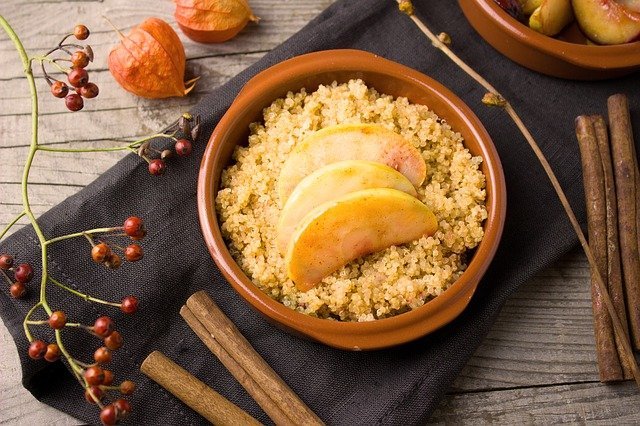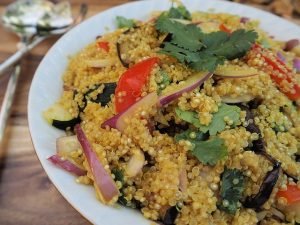What is Quinoa?
Quinoa is a gluten-free type of superfood that is highly recommended by doctors for its incredible health benefits, particularly because it’s so high in protein.
It contains vitamins, minerals, antioxidants, and plenty of energy, making it one of nature’s healthiest and most delicious meals. Its use dates back as far as 3000 BC, where it was also made into flour or used as a delicious grain just like it is used today.
It has a wonderful nutty flavor and can be whipped up in less than 20 minutes, being one of the easiest and most nutritious meals to make whether you like it salty or sweet.
What are the health benefits of Quinoa?
1. Excellent for digestion
A study conducted at the University of Valencia in Spain found that quinoa had almost twice as much fiber as other grains, which is excellent for digestive health.
Every 100 grams contains between 10-16 grams of dietary fiber, which helps to prevent constipation and cleanses the colon of toxins and waste. Quinoa is also naturally gluten-free, which is great for those who are gluten intolerant but still want to enjoy a starchy meal like pasta: it is gentle on the colon and great for digestion.
2. Builds strong and lean muscles
Quinoa is one of the few grains that contains all the essential amino acids, which means that it is a complete protein that is great for building lean, strong, and healthy muscles.
Essential amino acids mean those that cannot be produced by the body and therefore must be supplemented through the diet: in this sense, quinoa is the perfect choice.
One cup of cooked quinoa contains 8 grams of pure protein, which meets 16% of the average daily recommended amount.
3. Promotes weight loss
The 2009 edition of the Journal of the Science of Food and Agriculture praised quinoa for its incredible balance of protein, fiber, fat, carbohydrates, and nutrients. There’s nothing like a completely balanced meal to promote natural weight loss because it helps you to feel full, satisfied, and fully nourished.
The high amount of fiber and protein make it one of the best meals to shed excess weight, and the added bonus is that it’s very low in fat, containing only 2% of healthy omega fats that also support weight loss.
4. Reduces the risk of cardiovascular disease
Cardiovascular disease is the number one killer in the world today, accounting for more than 17 million deaths per year. Research shows that most cases are 100% preventable if a healthy diet and lifestyle were consistently adopted, and quinoa is the perfect fit.
The excellent dose of magnesium at 30% of the recommended daily amount per cup ensures that arteries remain supple and healthy, while the high amount of fiber ensures that triglyceride and cholesterol levels are kept in check.
5. Improves circulation
Blood clots and poor circulation pose serious health risks because it can lead to strokes, heart attacks, hypertension, and brain damage. Quinoa is rich in magnesium, iron, Omega 3 fatty acids, and fiber which are all excellent for maintaining proper circulation. This also helps to keep the blood clean and free of toxins, which is also great for health.
Quinoa is a low GI (Glycemic Index) food, which means that it’s a great choice for preventing the blood sugar spikes and fluctuations that can lead to headaches, dizziness, and the development of Type 2 diabetes.
It’s got a GI score of 53, which is low compared to many other types of grains and has been proven to keep blood sugar levels stable and balanced.
7. Prevents osteoporosis
The Department of Biomedical, Surgical, and Dental Sciences at the University of Milan found that osteoporosis is often caused by a magnesium deficiency, which quinoa can certainly help to rectify.
Western diets often miss out on this important mineral, which helps to prevent bone calcification due to its high alkalinity. Quinoa also contains calcium, which helps to maintain strong and healthy teeth and bones.
8. Gives plenty of energy
Just one cup of filling quinoa offers 222 calories, which is approximately the same amount of natural energy that brown rice offers. The high fiber and protein content ensure that you stay fuller for longer, while the nutrients keep every cell nourished between meals.
If you want plenty of energy with minimal effort and snacking, quinoa is your best bet, which is why so many athletes and health professionals have made it their staple.
9. Boosts Immunity
Quinoa has powerful antibacterial and antiseptic properties, which is great for keeping the immune system strong to fight off any infections. It also contains lysine, which is a special type of amino acid that naturally boosts immunity.
10. Prevents anemia
Anemia is a condition that develops from an iron deficiency and can cause extreme fatigue, headaches, migraines, and nausea. It leads to a lack of red blood cells that are required to transport oxygen throughout the body, which is why it’s so important to ensure that you are getting enough iron in your diet.
One cup meets 15% of the daily recommended amount, and combining quinoa with beans, spinach, beets, and other iron-rich foods will ensure that you are giving your red blood cells the support that they need to stay healthy.
More oxygen means better brain function, more energy, and healthy cells, and it can easily be achieved by including this healthy grain in your diet.
11. Anti-aging
The International Journal of Dermatology found that the zinc in quinoa was particularly effective at reducing the visible signs of aging, such as fine lines, wrinkles, and skin pigmentation.
It is also high in powerful antioxidants that help to reduce free radical damage caused by exposure to the sun’s UV rays, chemicals, and environmental pollution. One study found that quinoa had the highest number of antioxidants compared to 9 other types of grains and cereals, which makes it the top choice for anti-aging benefits.
12. Natural anti-inflammatory
Quercetin and kaempferol are two powerful flavonoids that are present in quinoa and have been proven to have a natural anti-inflammatory effect. Studies have shown that the development of as many as 60% of all diseases can be associated with inflammation, which makes quinoa an excellent choice for minimizing the risk.
The magnesium in quinoa is also an excellent anti-inflammatory, helping to reduce any pain and discomfort associated with swelling.
13. Protects the liver
According to the official publication of the American Society for Parenteral and Enteral Nutrition, zinc has been shown to prevent both viral and alcoholic liver disease and that those who suffer with it can improve their health by getting sufficient dietary zinc.
Quinoa meets 13% of the recommended daily amount of zinc per cup, which will help to keep the liver healthy.
14. Balances fluids
Water and fluid retention can be an extremely frustrating and discomforting condition to deal with and can lead to the development of more serious health conditions. The magnesium, potassium, and phosphorus in quinoa helps to flush out excess fluids and keeps everything in balance. This is especially important for athletes because it helps to prevent muscle cramps and keeps the body lean, fit, and healthy.
15. Prevents kidney stones
One cup of cooked quinoa meets 9% of the daily recommended amount of potassium, which studies have strongly associated with preventing the formation of kidney stones. In a 2009 study conducted in Italy it was demonstrated how just 6-weeks of potassium supplementation could result in the dissolution of kidney stones, which is promising as a natural solution.
The soluble fiber also helps to keep vital organs in good health, preventing any clogging and therefore inhibiting the formation of stones during the cleansing process.
16. Great for metabolism
Researchers from the Department of Food Science & Microbiology at the University of Milan discovered that the amazing nutrition that quinoa offers helps to reduce triglyceride levels, blood sugar, and insulin, which has a very positive effect on metabolic health.
A separate study conducted by the Department of Food Chemistry and Nutrition in Poland showed that quinoa effectively inhibited the negative effects of a high-fructose diet, demonstrating its ability to prevent long-term damage to the metabolism and thyroid.
17. Helps to prevent cancer
A study conducted at the Department of Nutrition in Sao Paolo in Brazil found that quinoa contained the most antioxidants out of all grains, offering polyphenols, phenolics, and anthocyanins.
These antioxidants are excellent for inhibiting the growth, development, and spread of cancer cells, and have even been proven to reduce the size of existing tumors. Sprouting quinoa seeds has been found to magnify the antioxidant effect, helping to radically reduce free radical damage, and to stop cancer in its tracks.
18. Lowers the risk of diabetes 
Being a low GI food source with plenty of protein and fiber makes this grain one of the best ways to lower the risk of developing Type 2 diabetes, which affects more than 29 million people in the United States. It is filling, delicious, and very healthy, which helps to reduce junk food cravings that can cause obesity and insulin resistance.
The super supply of vitamins and minerals also helps to keep cells nourished and the body in balance, while giving your body exactly what it’s asking for without any negative consequences.
19. Promotes longevity
A study published in the Biomed Central journal found that regularly consuming wholegrains like quinoa helped to reduce the risk of premature death significantly, helping to prevent the risk of developing cancer, diabetes, and heart disease, the top causes of mortality in the modern world.
The American Journal of Epidemiology states that high-fiber diets can help to increase lifespan, which makes quinoa one of the best sources of nutrition if you want to live and long, happy, and healthy life.
20. Heals wounds faster
The antiseptic properties of quinoa have been known for centuries, being used to effectively aid in healing wounds and injuries more efficiently. It’s also naturally antimicrobial and antibacterial, which can help to heal fungal infections, dandruff, skin rashes, and open wounds.
Any health risks?
Quinoa seeds are lightly coated with chemicals known as saponins, which the Environmental Protection Agency confirms is to protect the plants from diseases caused by fungi, viruses, and bacteria.
This makes it very important to rinse before use because, according to the horticultural department at Purdue University, can cause an upset stomach. It’s also recommended to start incorporating quinoa slowly to allow your stomach to get used to the new high-fiber intake, which could initially cause mild diarrhea and symptoms of detoxification, depending on your current state of health.
Where to get it?
Quinoa can be bought online and at most supermarkets and grocery stores today. It is usually available in the form of a grain, flour, or flakes and can usually be found near other grains, like rice, barley, and beans.
Black, red, and white varieties are usually available, with all of them containing the same incredible health benefits.
How to make it?
Rinse 1 cup of quinoa before use. For every cup of uncooked quinoa, add 2 cups of water and allow it to boil on low heat for 15-20 minutes or until most of the liquid has been absorbed. Fluff it with a fork and add any sauce, vegetables, nuts, or sweet ingredients that you like, just like you would make rice or other grains.
How to incorporate it into your diet?
It’s as easy as replacing rice in any recipe and can be made savory or sweet to suit your personal taste. It’s mild, nutty flavor is great whether quinoa is served warm or chilled, and can even be used in baking, as a breakfast cereal, or as a delicious side dish.
Some people even use quinoa to thicken soups or stews, taking the nutritional profile of an ordinary dish to the next level.
Sources:
https://www.iofbonehealth.org/recipe-ingredients/quinoa
http://www.diabetes.org/diabetes-basics/statistics/?referrer=https://www.google.co.za/
http://www.who.int/mediacentre/factsheets/fs312/en/
https://www.cdc.gov/diabetes/data/statistics/2014statisticsreport.html
http://www.theheartfoundation.org/heart-disease-facts/heart-disease-statistics/
https://www.cdc.gov/heartdisease/statistics.htm
http://www.phytochemicals.info/phytochemicals/saponins.php
https://www.ncbi.nlm.nih.gov/pmc/articles/PMC2928447/
http://ajcn.nutrition.org/content/96/2/337.full
http://online.liebertpub.com/doi/abs/10.1089/109662004322984734







